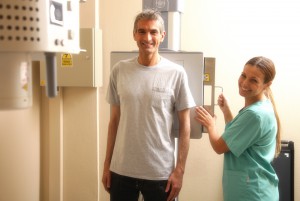
Cancers start out as small, stage I tumors, but they grow larger (stage II), then larger and spread to lymph nodes (stage III), and finally spread to other parts of the body (stage IV). It is important to detect cancer at the earliest possible stage, because treatment in the earlier stages is more effective.
One way to detect cancer in the early stages is with screening tests. Screening tests are given to people when they reach a certain age, even if they don’t have symptoms of cancer. Examples include mammogram for breast cancer, PAP smear for cervical cancer, colonoscopy for colon cancer, and PSA for prostate cancer. PSA is still controversial, because clinical trials have not yet proven it saves lives, but many doctors recommend it. Mammograms begin at age 40, PAP smears begin when women become sexually active, colonoscopy and PSA testing begin at age 50. Higher risk patients with cancer in their families may be screened earlier. We don’t yet have standard screening for lung cancer, ovarian cancer, or other cancers. In Japan, fiberoptic endoscopy is used to screen for stomach cancer, but in Western countries screening is not done because stomach cancer is rare.
If someone develops an early warning sign, they need to be tested. For example, a new or changing mole could be skin cancer, blood in urine might be bladder or kidney cancer, vaginal bleeding in a postmenopausal woman could be endometrial cancer, and blood in the stool could be colon cancer.
Not every case can be diagnosed at an early stage. There are many reasons for this? some cancers don’t produce symptoms until they reach an advanced stage, and some symptoms are too nonspecific for an early diagnosis. Furthermore, screening and diagnostic tests are imperfect, and we lack screening tests for many cancers such as ovarian, lung, and pancreatic cancer. An important task is to develop better tests for cancer screening and diagnosis, to insure that more cancers are found at earlier, more treatable stages.
In addition to cancer screening and early detection, prevention is also important. This will be the focus of next month’s article.

